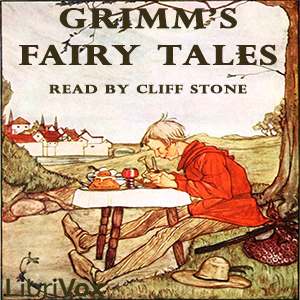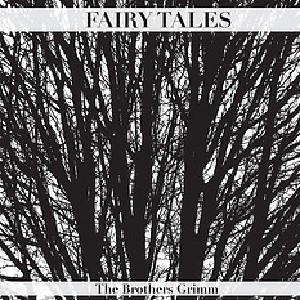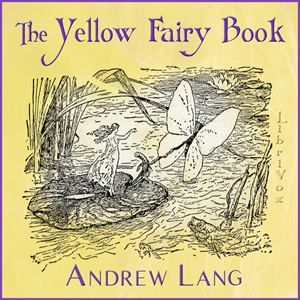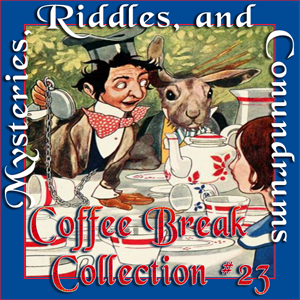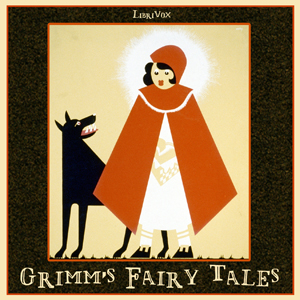The Dragon and His Grandmother - Brothers Grimm
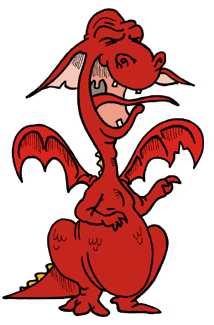
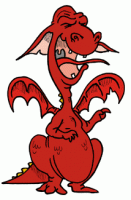
This is a rather puzzling story - puzzling in the sense that it has three tricky riddles in it. It’s also about a rather unusual dragon who has a human grandmother who is even trickier than he is, but who has a kinder heart. The story was originally by the Brothers Grimm and also appeared in the Yellow Fairy Book of Andrew Lang.
We’ve slightly adapted the riddles drawing on the famous riddle of the Sphinx from Oedipus Rex and a couple of old rhyming riddles which we hope you will find fun.
Proofread by Claire Deakin & Jana Elizabeth.
There was once a great war, and the King had a great many soldiers, but he gave them so little pay that they could not live upon it. Then three of them decided to run away from the army.
One of them said to the others: “If we are caught, we shall be hanged on the gallows; how shall we set about it?” The other said: “Do you see that large cornfield there? If we were to hide ourselves in that, no one could find us. The army cannot come into it, and tomorrow it is to march on.” They crept into the corn, but the army did not march on, but remained encamped close around them. They sat for two days and two nights in the corn, and grew so hungry that they nearly died; but if they were to venture out, it was certain death.
They said at last: “What use was it, our deserting from the army? We must die here miserably.” Whilst they were speaking, a fiery dragon came flying through the air. It hovered near them, and asked why they were hidden there.
They answered: “We are three soldiers, and have deserted because our pay was so small. Now if we remain here we shall die of hunger, and if we move out we shall be strung up on the gallows.”
“If you will serve me for seven years,” said the dragon, I will lead you through the midst of the army so that no one shall catch you.”
“We have no choice, and must take your offer,” said they. Then the dragon seized them in his claws, took them through the air over the army, and set them down on the earth a long way from it.
He gave them a little whip, saying: “Whip and slash with this, and as much money as you want will jump up before you. You can then live as great lords, keep horses, and drive about in carriages. But after seven years you are mine.” Then he put a book before them, which he made all three of them sign. “I will then give you three riddles,” he said, “if you guess them, you shall be free and out of my power.” The dragon then flew away, and they journeyed on with their little whip. They had as much money as they wanted, wore grand clothes, and made their way into the world. Wherever they went they lived in merrymaking and splendour, drove about with horses and carriages, ate and drank, but did nothing wrong.
The time passed quickly away, and when the seven years were nearly ended, two of them grew terribly anxious and frightened, but the third made light of it, saying: “Don’t be afraid, brothers. I wasn’t born yesterday; I will guess the riddles.”
They went into a field, sat down, and the other two pulled long faces. An old woman passed by, and asked them why they were so sad. “Alas! What have you to do with it? You cannot help us.”
“Who knows?” She answered. Then they told her that they had become the servants of the dragon for seven long years, and how he had given them money as plentiful as blackberries; but as they had signed their names, they were his – unless when the seven years had passed they could guess a riddle. The old woman said: “If you would help yourselves, one of you must go into the wood, and there he will come upon a tumble-down building of rocks which looks like a little house. He must go in, and there he will find help.”
The two melancholy ones thought: “That won’t save us!” They remained where they were, but the third and merry one jumped up and went further into the wood until he found the rock hut. In the hut sat a very old woman, who was the dragon’s grandmother. She asked him how he came, and what was his business there. He told her all that happened, and because she was pleased with him she took compassion on him, and said she would help him.
She lifted up a large stone which lay over the cellar, saying: “Hide yourself there; you can hear all that is spoken in this room. Only sit still and don’t stir. When the dragon comes, I will ask him what the riddle is, for he tells me everything. Listen carefully to what he answers.”
At midnight the dragon flew in, and asked for his supper. His grandmother laid the table, and brought out food and drink until he was satisfied, and they ate and drank together. Then in the course of the conversation she asked him what he had done in the day, and how many souls he had conquered.
“I haven’t had much luck today,” he said, “but I have a tight hold on three soldiers.”
“Indeed! Three soldiers!” said she. “Who cannot escape you?”
“They are mine,” answered the dragon scornfully, “for I shall only give them three riddles which they will never be able to guess.”
“What sort of riddles are they?” she asked.
“The first is like this,” said the dragon. “What goes on four legs in the morning, on two legs at noon, and on three legs in the evening?”
The old lady looked quite baffled and said: “Tell me, my fiery grandchild. What does go on four legs in the morning, on two legs at noon, and on three legs in the evening?”
“Why?” laughed the dragon. “A person does! He crawls on all fours as a baby, walks on two legs as an adult, and walks with two legs and a stick in old age.”
The old lady exclaimed: “No one else has riddles as cunning as yours. They are unlikely to guess the answer to that one for sure. But if they do, what is your second riddle?”
The dragon replied that his second riddle was just as devious and even prettier for it was in the form of a rhyme that went like this:
“Though of great age,
I’m kept in a cage.
Having a long tail and one ear,
My mouth it is round,
And when joys do abound,
O, then I sing wonderful clear.
What am I?”
“Can’t you guess the answer? Why I am a bell of course. Dong!” said the dragon.
The old lady shook her head in wonderment at her grandson’s ingenuity. “Oh you are quite the most cunning dragon who ever lived and breathed fire!” she exclaimed. “What do you have for your final and most difficult riddle?”
“Oh just some simple arithmetic,” said the dragon.
“As I was going to St. Ives,
I met a man with seven wives.
Every wife had seven sacks,
Every sack had seven cats,
Every cat had seven kits –
Kits, cats, sacks, and wives,
How many were going to St. Ives?”
As the old lady could not answer, he said: “Only one was going to St. Ives. All the others were going the other way! Ha! The souls of the three soldiers are mine for sure.” Then the dragon ate his supper of hot coals and soup made from boiling oil and went to bed.
When the dragon was soundly asleep, his old grandmother pulled up the stone and let out the soldier. “Did you pay attention to everything?”
“Yes,” he replied. “I know enough, and can help myself splendidly.” Then he went out by another way, through the window secretly, and in all haste back to his comrades. He told them how the dragon had been outwitted by his grandmother, and how he had heard from his own lips the answer to the riddles.
They were all delighted and in high spirits, took out their whip, and cracked so much money that it came jumping up from the ground. When the seven years had quite gone, the fiendish dragon came to the soldiers with his book, and pointing at the signatures, said: “And now you must answer my riddles or your souls shall be mine for all eternity. What goes on four legs in the morning, on two legs and noon, and on three legs in the evening?”
The first soldier replied: “A person.”
The dragon was much annoyed, and hummed and hawed a good deal, and asked the next riddle:
“Though of great age,
I’m kept in a cage.
Having a long tail and one ear,
My mouth it is round,
And when joys do abound,
O, then I sing wonderful clear.
What am I?”
“A bell,” said the second soldier.
The dragon made a face, and growled again three times, “Hum, hum, hum,” and said to the third:
“As I was going to St. Ives,
I met a man with seven wives.
Every wife had seven sacks,
Every sack had seven cats,
Every cat had seven kits –
Kits, cats, sacks, and wives,
How many were going to St. Ives?”
“Only One,” replied the third soldier.
Then the dragon flew away with a loud shriek, and had no more power over them. The three soldiers took the little whip, whipped as much money as they wanted, and lived happily to their lives end.

